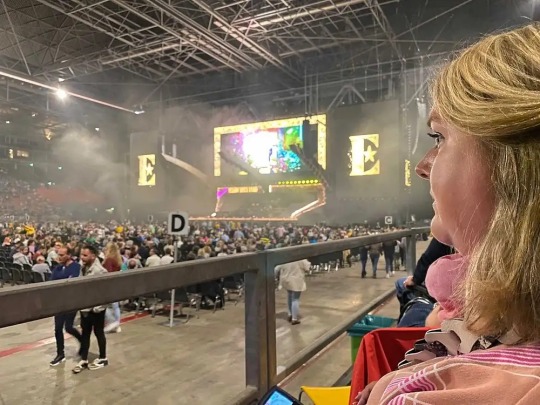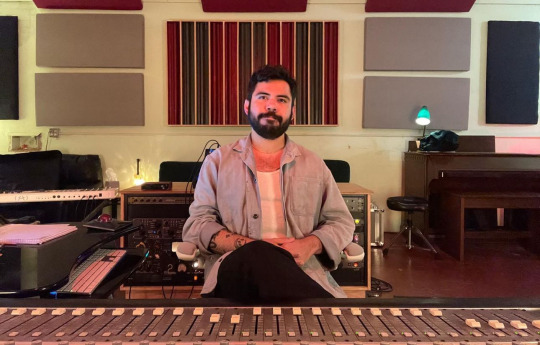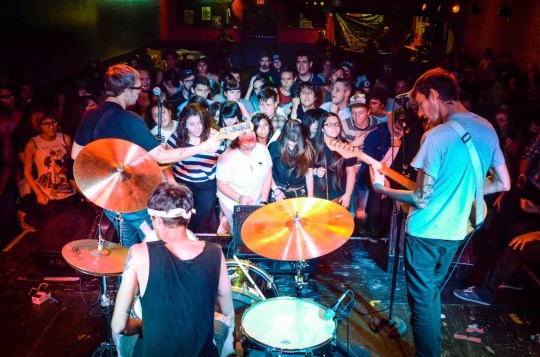Don't wanna be here? Send us removal request.
Text
Album Review: SMALL JOYS - Color Me Blind

I’ve been reluctantly accepting that the turn some of bands are taking with their new records are indeed “pop” - that “pop” or “pop rock” is actually an accurate description of some of the music that has really been landing for me lately. Pop may be the antithesis of punk to some, but a lot of my favorite punk bands from the 2010s are reclaiming the term, writing fun and catchy songs that maintain a punk ethos while leaning into pop sensibilities. SMALLS JOYS new record, COLOR ME BLIND sounds like an early 2000’s movie soundtrack with bite.
Some tracks, like “Watershed,” or “Tiffy” might lean a bit too much into these pop sensibilities; the songs sound like something you’d hear at the mall more than something you’d hear at a warehouse show, or in the earlier moments of the band’s discography.
Still, even the weaker songs on the album have merit. “Seventeen” is an ode to youth, celebrating the angst, uncertainty, and excitement of early adulthood. The track’s opening riff, with its tense build up and booming release, feels like the anxious build up of teenagehood into young adulthood. Though the song may feel repetitive to some, with the chorus repeating four times in a three-and-half-minute span, it’s nonetheless a relatable song with a catchy opening riff that I find myself wanting to play over and over again.
The track “Constant Nothing,” sounds like seminal SMALL JOYS. The song recounts the morning after a regrettable hookup - it’s an honest, playful song with an anthemic quality that will have it stuck in your head for days and days and days.
I was lucky enough to see the band at their record release show, and hearing the album live really helped me to understand what the band was trying to move towards with this release: the songs were full of charm and energy. Recorded, I felt like some of the tracks fell a bit flat, but there are definitely some gems on this record, and enough of them that I think this will be a contender or one of my top albums in 2020 at the end of the year.
RATING: 8.2/10
0 notes
Text
PLAY FOR ALL: Making Live Music Accessible - An Interview with Sarah Anderson

Sarah Anderson, founder of the Oakland-based nonprofit PLAY FOR ALL, is reshaping how we think about accessibility in live music. Frustrated by the challenges she’s faced navigating general admission venues as a wheelchair user, Anderson launched PLAY FOR ALL in 2018 to advocate for more equitable concert experiences. The organization offers crucial information about venue accessibility, empowering concert-goers and fostering dialogue between venue operators, promoters, and fans.
Sarah shared insights with me about self-advocacy, accessibility misconceptions, and where the bay area’s venues stand in regards to accessibility compared to other cities.
*
Sarah recalls the turning point in her thinking about concert-going: "After spine surgery in 2016, I realized I couldn't keep putting myself in unsafe situations at shows. Venues often had no solutions for accessible viewing beyond vague or dismissive responses." Her frustration led her to create the PLAY FOR ALL database, offering transparency and holding venues accountable while advocating for structural change.
“The Bay Area has been mostly average when it comes to accessibility,” Sarah says, noting that there are a mix of venues who make accessibility a priority as well as those who don’t pay it any mind. “One challenge,” she noted, “is that a lot of the ‘historic’ buildings in the area are exempt from modern accessibility upgrades.” Still, she believes the excuse isn’t good enough: "If a building functions, it should be accessible. History can’t be a barrier."
Sarah highlights standout venues like the Sinkhole and 1098, which proactively address accessibility, but stresses that too many venues still treat accessibility as an afterthought.
“Many venues think letting you in the door is enough,” Anderson explains. "But accessibility means more than that—it’s about fully experiencing the show, moving freely, and having easy access to ramps and restrooms." She advocates for permanent accessible viewing areas, lamenting the temporary fixes some venues implement only when prompted.
Sarah encourages bands to use their influence in encouraging great concert accessibility: “A lot of bands are making venues accountable by including accessibility requirements in their contracts. Their support is invaluable.”
Even as a smaller DIY organization, PLAY FOR ALL is making waves. "When someone tells me they went to a show because of our work, it’s worth it," Anderson says.
0 notes
Text
Anthony Razo - An Interview

How old were you when you started playing music?
AR: Nine or ten. My dad played, so music was always in the house, and I’d wanted to play pretty much as far back as I can remember. So I started playing when I was really young. I’m grateful for that. I think you get a different kind of foundation when you start at an early age like that. Like the instrument becomes engrained in your brain in a different way or something. And I think it’s easier to learn when you’re young. It’s like with languages.
And did you take lessons, or?
AR: For a little bit. I went for a year or so to this guy in Uptown Whittier and learned some basic theory. But I was mostly self-taught.
Can you tell me what that process was like for you, teaching yourself?
AR: I mean, the best way to learn guitar is by learning songs. So I’d come home from school and practice, and read tabs from bands that I liked. And if the song was difficult, I’d just work at it until I could play it. Sometimes I’d use YouTube. But it was really just a matter of learning other people’s songs and practicing.
Yeah. I wonder how people learned music before the Internet.
AR: [Laughs.] I’m sure it was a lot harder.
Who were some of those early bands that got you really excited about music?
AR: Modest Mouse and Brand New were huge for me. And I still love those bands. Earlier it was proggy stuff, like Coheed and Fall of Troy. A little later it was mathier stuff like Terra Melos and A Lot Like Birds. But Modest Mouse and Brand New were the bands that really changed my perception of what music could do, what music could be.
I feel like you gained such a solid foundation as a guitar player, learning songs by bands like Coheed or Terra Melos.
AR: They write some pretty crazy parts, for sure. And even if I’m not sweeping or tapping or anything in the songs that I work on now, I think that that foundation was still really important for me as a player. Learning those songs helped me to become skilled enough to do pretty much whatever I want on the fretboard. I’m sure writing’s a little bit like that too. Like, you need to be able to do a lot of different things, even if you’re not going to be showing off those skills all the time. Does that make sense?
When was it that you started writing your own songs and playing with other people?
AR: Sixth grade. My best friend played guitar, too, and we were both in school band, so we found some other people to play with and took it from there. At first it was all covers, then we started writing our own stuff.
Do you think that was useful for you at all, playing in school band?
AR: You know, I don’t know. I’m sure it was in ways.
And that project with your friend from school, that’s what would turn into WTL?
AR: Yeah. We had a different name before that, but I’m not gonna say it.
[Laughs.] Fair enough. And the way I understand it is that playing in WTL, you recorded your first two full-length albums and had your first real recording experiences.
AR: That’s right. We were in high school, and I knew this guy Robert Cheek had recorded Terra Melos, so I really wanted to work with him. So we saved our money and started a Gofundme and made it happen.
A pretty seminal experience for you, yeah? Robert’s become your mentor, basically.
AR: I love Robert. Yeah, that’s definitely when I got into the idea of engineering. I kind of shadowed Robert all week, just paying attention to what he was doing. He had also worked with bands like Deftones and Band of Horses, so I knew he knew what he was doing, and I wanted to learn. And even though I was just a high school kid then, we were able to develop a pretty strong friendship.
Can you tell me more about that relationship and how Robert’s kind of helped you along your way as a recording engineer?
AR: Sure. So we met when I was pretty young, like I said. And he’s always been super helpful just, like, answering questions I might have about gear, or offering advice on how to get certain sounds. Most of what I know I’ve learned from Robert. He’s also helped me to get work. Like, he’s asked me to work with him on a lot of projects, and I’ve met a lot of different people through him. He’s been super generous, too, just like giving advice on how to navigate this field. And it’s all been honest advice. He’s never sugarcoated anything.
It’s so helpful and, like, validating to have a mentor like that.
AR: For sure.
When did you start recording on your own, then?
AR: Pretty shortly after recording with Robert as a teenager, I asked my grandma for a loan so I could buy a bunch of recording gear and build a studio.
What is it that you love so much about engineering? Versus, say, playing.
AR: It’s just so fun being in the studio. I love tweaking with gear and sounds until things sound the way you want them to. I love experimenting and getting surprised. And I like helping people’s visions come to life. Like, everyone’s having a good time when they’re recording songs. Or not everyone, some people get really manic and stressed, but for the most part the atmosphere is positive and exciting, even when the days are crazy long. And, you know, playing can be really exhausting. Touring can suck. I think I’ve always had more fun putting songs together than I have had playing in a band. So engineering just kind of lets me nerd out and enjoy all the things I enjoy most about music – gear, experimentation, community. It’s just a lot of fun.
I get that.
AR: Yeah.
Do you have a favorite record? I’ll say current and all-time.
AR: Man, favorites can be so tricky. I’m currently still pretty caught up on A Crow Looked at Me by Mount Eerie. It’s just such a heartbreaking album. Not to self-plug, but I’m also really stoked on how the last SJP record came out. I think it’s his best and most ambitious record yet, and I’m not only saying that because I got to work on it. I’m really excited for people to hear it.
When’s that out?
AR: We’re thinking late December!
I’m excited to hear it. And what about your all-time fav?
AR: I was avoiding the question! [Laughs.] I’m gonna go artists, and I’ll give you three: Death Cab, Motion City, and The Microphones.
You mentioned the Andres record that’s coming out soon, and I know you’ve been touring with him quite a lot. What’s that experience been like?
AR: It’s been great! We’re close friends, so that helps. But yeah, it’s a lot of fun. The turnouts are pretty consistently good, and I like everyone who he’s been hiring for the project, so I’m really happy to be a part of things. And as much as I can hate touring sometimes, it’s also a blast. I love traveling. I love playing. And I know I’m not gonna want to do this forever, so I’m just kind of soaking it all up.
You produced the new Andres record? Pretty much exclusively?
AR: Yeah, he and I produced it.
So you had a pretty heavy hand in the construction of the new songs? That probably makes it all feel a little more fun and rewarding.
AR: Yeah, for sure. He trusts me a lot, it’s awesome. I pitched a really expensive studio in Chicago, and he was just like, “Sure!” I pitched some really out there, avant-garde ideas, and he was just like, “Sure.” So it’s been cool working with him and knowing he trusts me to just kind of do my thing. And yeah, it makes the songs a lot more fun to play live, knowing I was able to help with writing them.
Have you been writing songs at all? Outside of working on the Andres record? And do you have any engineering projects in the pipeline?
AR: I have like eight or nine SL songs that I need to get recorded. I just don’t know when I’ll have the time or energy. I’ve been touring a lot, and when I’m not touring, I’m working, and we’re gonna be moving again soon…you know how it goes. But I’d like to get them recorded sometime next year, and I really hope that I’m able to. And then as far as engineering stuff goes, I have a few things in the pipeline, for sure. I’m recording our friend Fran’s debut LP for her project Therapy really soon, so I’m super stoked about that.
So much of the freelance engineering thing seems to be about networking. You seem pretty good at it.
AR: [Laughs.] Thanks. And yeah, I think you’re right. You just need to get to know people, make connections, make friends, show people you know what you’re doing, and, if you can, that you’re a good hang. I meet a lot of people when I’m touring with Andres, so that helps. I met a lot of people through No Better. So these connections kind of just accumulate.
You work out of several different studios, too.
AR: I do. I mean, lately I’ve had kind of a home base at Anjuna in Portland. You’ve recorded there. But yeah, there are like three or four studios that I work out of pretty consistently.
Is that a hard pitch? Getting people to agree to not only pay you to engineer and produce the record but also to rent these studio spaces that will allow the record to sound as good as it possibly can?
AR: It definitely can be. But I think that people who get it get it. It’s expensive to make a record. It’s really expensive to make a good-sounding record. And you get what you pay for. But I think people know that I’m a forward guy and that I’m just trying to make good art. Obviously I don’t want to break the bank, but if we’re going to work on a record together I want to make sure we have the time and space to make it the best record that it can be. And I used to think that it was like, a myth that the location mattered, but it really does.
Would you ever want to open a space like that? I mean a space of your own.
AR: If I won the lottery, yeah. [Laughs.] But no, of course. I hope I can, someday. Probably not a beachfront studio like Stinson. But having a comfortable place to work out of consistently? A place where the band could hang out and sleep? Yeah. I’d love to have that kind of studio space.
We’ll end there. Thanks so much for chatting, Ant. It was fun.
0 notes
Text

Show Review: SMALL JOYS at 924 Gilman
Another Thursday at 924 Gilman, except tonight weren’t the usual string of our beloved bay area punk bands: Long Beach’s SMALL JOYS was in town, touring on their most recent album COLOR ME BLIND. By 7 pm, the venue was filled.
It was incredible to see the amount of energy coming from the stage, matched with the crowd’s energy. It seemed as though every song was a group effort between the band and the audience. Since Small Joys played for nearly an hour, everyone in attendance got the amazing treat of hearing about 90% of the group’s two-album discography.
The band was careful to play all the fan favorites off the first album and their demo, and the songs of the new record, COLOR ME BLIND, felt more dynamic and alive than they seemed when I first listened to the album: hearing the songs performed definitely made me circle back to give them another chance, and I felt that I understood the latest effort better after hearing the band perform them live.
The band stayed energetic throughout their whole set. Fan favorites “By the Open Door” and “Beranda” saw the whole room singing along, stage diving, and chanting lyrics. It was simply electric.
I’m biased, though: I’ve loved this band since high school when they’d accompany me in my headphones on my walk to campus. This was my third time seeing them live, and I’m not exaggerating when I say they just keep getting better and better every year; something that can likely be attributed to the extensive touring they’ve been doing now that they’re becoming more popular.
My favorite part of the show was that the band ended their set by taking requests - responding to and playing requests of songs that they haven’t played in years, that they knew the crowd would respond to. I definitely recommend going to see SMALL JOYS live. The energy is indescribable and their fans are rambunctious but respectful - everyone just there to have a great time.
0 notes












